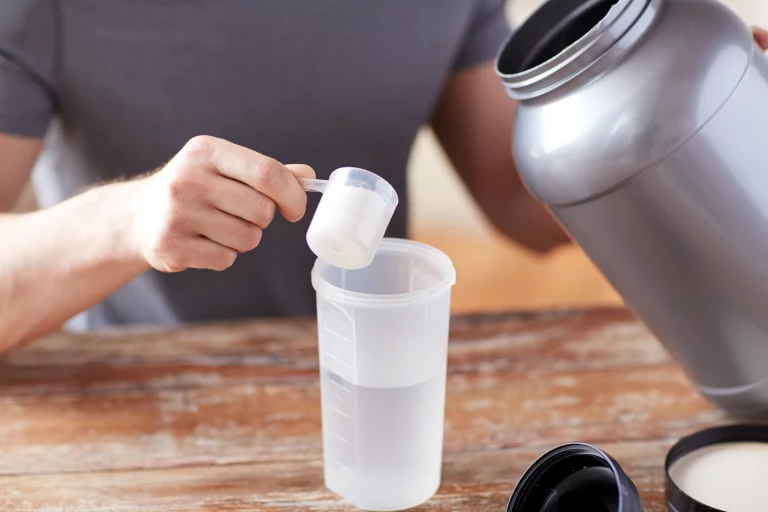Protein as a secret weapon in weight loss

You probably know that if you want to gain muscle mass, you need to consume enough protein. But did you know that their income is just as important when you want to lose weight? Indeed, current scientific studies indicate that a high-protein diet leads to a greater loss of body fat compared to a low-protein diet [1]. No matter your age, whether you are a carnivore or a vegetarian, a sufficient supply of quality protein should be your priority in all circumstances, not excluding sustainable weight loss.
Let's start with one very important thing - it doesn't matter which diet you end up in the end. We always move on two opposite banks - energy intake and energy expenditure. Everything else is just basic mathematics. To gain weight, your income must be greater than your expense. If you want to maintain the weight, the weighing pan must be in balance in this case. And if you want to lose weight, your spending must be greater than your income. Diets benefit from this simple concept and are based on the fact that they reduce the number of calories consumed, thus leading to a reduction in body weight. However, in this entire principle, proteins occupy a certain unshakable position:
A diet high in protein provides enough building blocks - amino acids, that your body needs to build and maintain muscle mass. The more muscle you have, the more calories you burn during the day. Not to mention that a physically fit individual is able to give much more power, and thus achieve a much greater energy expenditure.
Compared to other macronutrients (carbohydrates, fats), proteins have the highest thermal effect. This means that of the total amount of calories taken in the form of protein, up to 20-35 percent is consumed during their digestion. Compared to 5 percent (fats) or 10-15 percent (carbohydrates), this is a significant difference.
Studies also show that a high-protein diet helps to suppress appetite and is more sustainable in the long run than other types of diets [2, 3]. And any experienced nutritionist will tell you that the best diet is one that you can persevere with.
Protein can also help you lose weight by preserving your blood sugar levels within the normal range so that you don't get bout of wolf hunger so quickly, particularly during periods of reduced calorie intake [4, 5].
What do we mean when speaking about a high-protein diet?
It is the consumption of approximately 1.3 - 2.3 grams of protein per kilogram of body weight. In other words, protein makes up about 25-45 percent of daily caloric intake [6]. This large margin is given by considering the physical activity of a specific individual, as well as the physical constitution and purpose. If you are a regular trainer, or you are trying to lose weight more forcefully (reducing your normal daily caloric intake by at least 20 percent), you should be at the upper limit of your daily suggested protein intake. Other people may not be so stringent in this regard.
Which foods are the best sources of quality protein? And in general, what is the most important indicator of quality?
It is the content of all the essential amino acids that our body cannot make on its own in sufficient amounts. You should prioritize proteins that are easily digested and thus completely absorbed by our digestive system. From the rich list we select: eggs, whey protein, beef, fish and seafood (particularly salmon, mackerel, sardines, shrimp), chicken. Given that there are certainly those who prefer a vegetarian, vegan or plant-based diet, so we also have the following choice for them: proteins (soy or pea), soy products (tempeh, tofu), legumes, bulgur, quinoa, seeds (chia, hemp, pumpkin, sunflower).
We believe that we have slightly opened the door to the world of effective weight loss and we are keeping our fingers crossed for you to reach the physique of your dreams, even with the help of our products, produced in Slovakia in the appropriate quality and with love.
SOURCES
Halton, T. L., & Hu, F. B. (2004). The effects of high protein diets on thermogenesis, satiety and weight loss: a critical review. Journal of the American College of Nutrition, 23(5), 373-385.
Weigle, D. S., Breen, P. A., Matthys, C. C., Callahan, H. S., Meeuws, K. E., Burden, V. R., & Purnell, J. Q. (2005). A high-protein diet induces sustained reductions in appetite, ad libitum caloric intake, and body weight despite compensatory changes in diurnal plasma leptin and ghrelin concentrations. The American Journal of Clinical Nutrition, 82(1), 41-48.
Helms, E. R., Zinn, C., Rowlands, D. S., Naidoo, R., & Cronin, J. (2015). High-Protein, Low-Fat, Short-Term Diet Results in Less Stress and Fatigue Than Moderate-Protein, Moderate-Fat Diet During Weight Loss in Male Weightlifters: A Pilot Study. International Journal of Sport Nutrition & Exercise Metabolism, 25(2).
Westerterp-Plantenga, M. S., Nieuwenhuizen, A., Tome, D., Soenen, S., & Westerterp, K. R. (2009). Dietary protein, weight loss, and weight maintenance. Annual Review of Nutrition, 29, 21-41.
Arentson-Lantz, E., Clairmont, S., Paddon-Jones, D., Tremblay, A., & Elango, R. (2015). Protein: A nutrient in focus 1. Applied Physiology, Nutrition, and Metabolism, 40(8), 755-761.
Phillips, S. M. (2014). A brief review of higher dietary protein diets in weight loss: a focus on athletes. Sports Medicine, 44(2), 149-153.
Mangels, R. (1999). Protein in the vegan diet. The Vegetarian Resource Group, Nutrition.



